This article needs additional citations for verification .(April 2019) |
The Real End of the Great War is the English title for Prawdziwy koniec wielkiej wojny, a film released in 1957, directed by Jerzy Kawalerowicz.
This article needs additional citations for verification .(April 2019) |
The Real End of the Great War is the English title for Prawdziwy koniec wielkiej wojny, a film released in 1957, directed by Jerzy Kawalerowicz.
Roza (Lucyna Winnicka) marries a promising young architect, Juliusz (Roland Glowacki). They have a blissful life together for the first few months, but then World War II breaks out and Juliusz is deported to a concentration camp soon after. Months and years go by, and Roza gradually abandons any hope that her husband might return. She meets and falls in love with another man, and tries to put her life back together, but one day, unexpectedly, Juliusz does return - a shattered ghost of his former self, physically crippled and tormented by memories of the camps. First out of duty, and then out of pity, Roza starts to care for him, but her feelings slowly transform into a kind of revulsion.
Kawalerowicz here takes up a theme that would be frequently addressed by later Polish films: the lingering psychological and emotional scars wrought by the war, a kind of weight from the past impeding the creation of any kind of future.

Rosa Luxemburg was a Polish-born German revolutionary socialist, Marxist philosopher and anti-war activist. Successively, she was a member of the Proletariat party, the Social Democracy of the Kingdom of Poland and Lithuania (SDKPiL), the Social Democratic Party of Germany (SPD), the Independent Social Democratic Party (USPD), the Spartacus League, and the Communist Party of Germany (KPD). Born and raised in an assimilated Jewish family in Russian Poland, she became a German citizen in 1897.

Cyprian Kamil Norwid, a.k.a. Cyprian Konstanty Norwid, was a nationally esteemed Polish poet, dramatist, painter, and sculptor. He was born in the Masovian village of Laskowo-Głuchy near Warsaw. One of his maternal ancestors was the Polish King John III Sobieski.
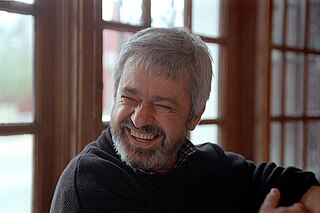
Jurek Becker was a Polish-born German writer, screenwriter and East German dissident. His most famous novel is Jacob the Liar, which has been made into two films. He lived in Łódź during World War II for about two years and survived the Holocaust.

Emily Hobhouse was a British welfare campaigner, anti-war activist, and pacifist. She is primarily remembered for bringing to the attention of the British public, and working to change, the deprived conditions inside the British concentration camps in South Africa built to incarcerate Boer and African civilians during the Second Boer War.
Polish Film School refers to an informal group of Polish film directors and screenplay writers active between 1956 and approximately 1963. Among the most prominent representatives of the school are Andrzej Wajda, Andrzej Munk and Jerzy Kawalerowicz.
Sławomir Rawicz was a Polish Army lieutenant who was imprisoned by the NKVD after the German-Soviet invasion of Poland. In a ghost-written book called The Long Walk, he claimed that in 1941 he and six others had escaped from a Siberian Gulag camp and begun a long journey south on foot, supposedly travelling through the Gobi Desert, Tibet, and the Himalayas before finally reaching British India in the winter of 1942.
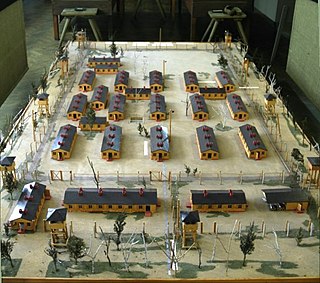
Stalag Luft III was a Luftwaffe-run prisoner-of-war (POW) camp during the Second World War, which held captured Western Allied air force personnel.
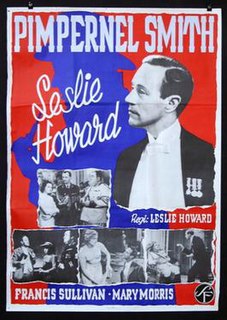
"Pimpernel" Smith is a 1941 British anti-Nazi thriller, produced and directed by its star Leslie Howard, which updates his role in The Scarlet Pimpernel (1934) from Revolutionary France to pre-Second World War Europe. The British Film Yearbook for 1945 described his work as "one of the most valuable facets of British propaganda".

Kremenets is a city in Ternopil Oblast (province) of western Ukraine. It is the administrative center of the Kremenets Raion (district), and lies 18 km north-east of the great Pochayiv Monastery. The city is situated in the historic region of Volhynia. It hosts the administration of Kremenets urban hromada, one of the hromadas of Ukraine. Population: 20,674
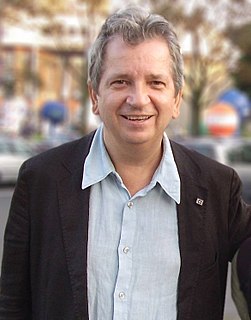
Juliusz Machulski is a Polish film director and screenplay writer. Son of noted actor Jan Machulski, Juliusz became notable for his comedies ridiculing the life in communist-ruled Poland of the 1970s and 1980s.

Jerzy Franciszek Kawalerowicz was a Polish film director and politician, having been a member of Polish United Workers' Party from 1954 until its dissolution in 1990 and a deputy in Polish parliament since 1985 until 1989.
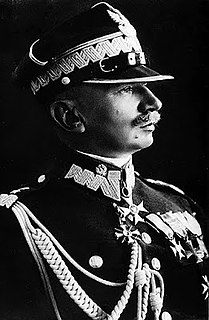
Juliusz Karol Wilhelm Józef Rómmel was a Polish military commander, a general of the Polish Army.

Cold Mountain is a 1997 historical novel by Charles Frazier which won the U.S. National Book Award for Fiction. It tells the story of W. P. Inman, a wounded deserter from the Confederate army near the end of the American Civil War who walks for months to return to Ada Monroe, the love of his life; the story shares several similarities with Homer's Odyssey. The narrative alternates back and forth every chapter between the stories of Inman and Ada, a minister's daughter recently relocated from Charleston to a farm in a rural mountain community near Cold Mountain, North Carolina from which Inman hails. Though they only knew each other for a brief time before Inman departed for the war, it is largely the hope of seeing Ada again that drives Inman to desert the army and make the dangerous journey back to Cold Mountain. Details of their brief history together are told at intervals in flashback over the course of the novel.
The 2005 Polish Film Awards ran on March 5, 2005. It was the 7th edition of Polish Film Awards: Eagles.
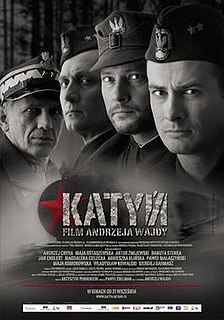
Katyń is a 2007 Polish historical drama film about the 1940 Katyn massacre, directed by Academy Honorary Award winner Andrzej Wajda. It is based on the book Post Mortem: The Story of Katyn by Andrzej Mularczyk. It was nominated for Best Foreign Language Film for the 80th Academy Awards.

Pharaoh is a 1966 Polish film directed by Jerzy Kawalerowicz and adapted from the eponymous novel by the Polish writer Bolesław Prus. In 1967, it was nominated for an Academy Award for Best Foreign Language Film. It was also entered into the 1966 Cannes Film Festival. It sold more than 7 million tickets in Poland, becoming one of the highest-grossing Polish films of all time. Pharaoh is among 21 digitally restored classic Polish films chosen for Martin Scorsese Presents: Masterpieces of Polish Cinema.

Roza Eskenazi was a famous Jewish-Greek dancer and singer of rebetiko, Greek folk music, Kanto and Turkish folk music born in Constantinople, whose recording and stage career extended from the late 1920s into the 1970s.

Juliusz Słowacki Polish Grammar School is a Polish grammar school (gymnasium) in the town of Czeski Cieszyn, in the Zaolzie region of the Czech Republic. It is the only Polish secondary school in the country, serving the educational purposes of the Polish minority in the Czech Republic.

Farewell Herr Schwarz is a 2014 German–Israeli documentary film by Yael Reuveny, in her directorial debut. In it she attempts to answer for herself and her family why her great-uncle, a Holocaust survivor, chose to resettle in East Germany afterwards and start a family there, a life her family in Israel only learned about after his death in the late 1980s. In the process of talking to his family, her family, and visiting the home in Vilnius where her great-uncle and grandmother lived with their family before the war, Reuveny considers issues of forgiveness, reconciliation and the effect of the Holocaust on the third generation of survivors, from her own perspective as an Israeli expatriate in Germany.
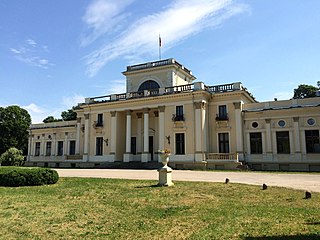
Traku Voke Manor is a former residential manor in Traku Voke. It is a monument of historicist architecture with elements of Neo-Gothic, classicism, eclectic style, located halfway between Vilnius and Trakai. The Manor was established in the end of the 19th century.